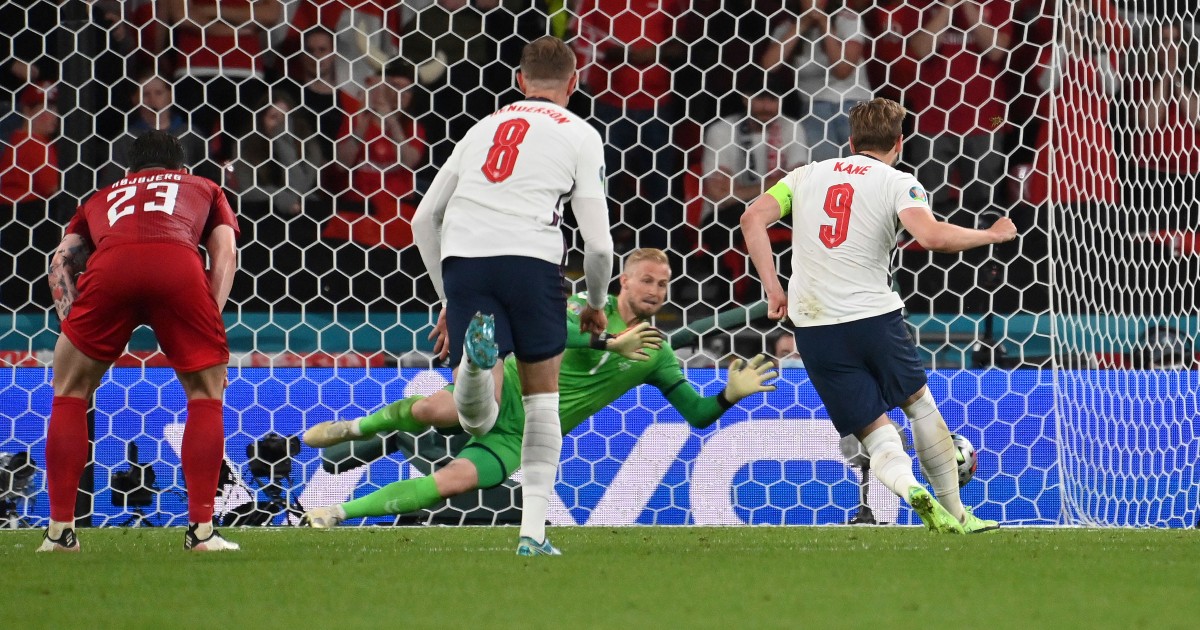Whenever we see the words ‘IFAB’ and ‘proposed law changes’ we instinctively react with three more of our own: ‘utter woke nonsense’.
Admittedly that’s usually because buried somewhere in there will be Professor Wenger’s absolutely f**king mental offside proposalsproposals which solve the problem of offsides being settled by tiny amounts on one side of a line by simply moving that line to a different place and then magically hoping that every player, coach and manager on earth doesn’t find out the rules have changed.
And you’ll be pleased to know that is indeed still in there, with trials apparently ongoing. Trials we assume that involve someone sat patiently trying to explain to Wenger precisely why this is at best no solution at all and at worst something that ruins the game entirely, perhaps in the style of Father Ted trying to explain to Dougal the difference between things that are small and things that are far away.
But there’s other stuff in there. Other interesting stuff. We’re only just now, of course, adapting to the brave new world where goalkeepers can concede corners for holding on to the ball for eight seconds and we are frankly giddy as all hell waiting for the first Premier League goal to come about as a result of that little piece of mischief.
Because we are so very, very greedy, we are going to need that goal to be conceded by Arsenal and we are going to need forensic study of the footage from intrepid online Gunners to reveal that David Raya or whoever in fact held the ball for 7.93 seconds.
So what of the new ideas that could find their way into the lawbook in time for next year’s World Cup if everyone’s quick enough about it?
The big one is around penalties. It initially had us spluttering in indignant rage at the sheer scale of the vandalism these clowns were willing to visit upon our fine game that is just fine as it is already, thank you very much. But then they were getting cross about it on talkSPORT and that means the idea can’t be all bad.
The idea is this: in-game penalties essentially become like shoot-out penalties. No rebounds. No continuation of play. They are an entirely self-contained event that contain one shot and one shot only. If the penalty is scored, everything proceeds as now. But if it’s saved, play stops and it’s a goal kick. Even if the keeper diverts it behind.
We instinctively and instantly hated it, but it’s been running around in our heads and we’ve come round to it to the extent of being full evangelical supporters. For several reasons.
One, it’s simpler. You no longer have to worry about encroachment. There’s no longer even any need to have the D on the penalty area at all, in fact.
The current rule has always given the penalty taker a big advantage. The 10-yard headstart the taker enjoys over everyone else means they are always likely to be first on the scene should a rebound be in play. And if they aren’t, it’s almost certainly because someone encroached and we have to go back and check and more time we’ll never ever get back dribbles away.
But it also feels like the first change to penalties in recent times that tilts the balance back towards the keeper and defending team, and that feels like a necessary course correction. It’s not necessarily that this specific change is vital and correct, more that it represents a welcome shift in the direction of travel.
There are more penalties awarded now for offences that are small and twatty. It’s hard to really quantify that beyond a gut feel, but our gut feels it strongly; more and more often a penalty is awarded where the scale of the punishment – effectively somewhere between 0.75 and 0.8 of an entire actual goal based on xG data – feels wholly out of line with the nature of the offence.
A penalty is, obviously, a punishment for the defending side’s transgression. But it’s one that’s already – and would remain – weighted very heavily in favour of the attacking team. It’s a free shot from close range against a keeper who must still be on their line at the time it’s taken. They should still pretty much always be scored. There’s no compelling reason why a striker should get a second chance, and the idea of the penalty as a unique standalone event is not one that should be hard for anyone to get their head round given just how long we’ve had shoot-outs now.
Other ideas floated in the latest reports are definitely still utter woke nonsense, though, because they centre on VAR and giving it more rather than less power. Anything that gives VAR more rather than less power and influence is utter woke nonsense by definition.
The problem here is that the ideas themselves seem reasonable enough. But they are insidious mission creep.
‘VAR should be able to check second yellow cards’ seems like a perfectly reasonable idea. We’ve even said as much before. It should, really, have been accounted for from the moment VAR was allowed to check for red cards, given its impact amounts to the same thing.
Were it already in, we wouldn’t be calling for its removal. But we’re wary of introducing it now purely because of the message it sends. That VAR can only be given more control, more influence, more scope to slow the game down.
It’s also far harder for VAR to get involved, we think, with yellow cards – even second ones. Whether or not something merits a yellow card is far harder to bring under the banner of ‘clear and obvious’ than it is with a red. And it’s still subjective there.
It’s only really in genuine cases of mistaken identity or where no offence has been committed at all that a second yellow can definitely be said to be entirely wrong, especially as yellow cards can and are given for an accumulation of offences, as signalled on field with the time-honoured sign language for totting up whereby the referee flamboyantly points to the assorted areas of the pitch where the offender’s minor atrocities have occurred, while wearing a faux-sad ‘what choice have you left me?’ expression familiar to parents the world over.
So yeah, we’re a bit wary of that one, but even more so the one about checking corners. Here’s where it really feels like VAR’s quest for domination really begins. ‘Oh don’t worry, we’ll only check for the ones we can overturn in a few seconds’. We don’t believe you. We just don’t believe that’s where it ends. A few seconds becomes eight seconds, becomes just one more replay, becomes at the end of the day getting the right decision is what matters, isn’t it?
There is undeniably a quirk that VAR sometimes goes a long way back in the build-up to a goal to chalk it off but a goal scored from a wrongly awarded corner is just shrugged off, but this still feels like a big step down a very dark road.
Just as kids want a realistic, down-to-earth show that’s completely off the wall and swarming with magic robots (and also you should win things by watching), these are changes that imply people want a VAR that’s unintrusive, doesn’t take up too much time but spots everything and gets every decision right.
It’s a unicorn; it doesn’t exist. And we shouldn’t risk tearing the very fabric of the game any further in the hunt for it.
But yeah, penalty rebounds can absolutely go in the bin. Just score them properly, or not at all.
READ MORE: Premier League new home kits ranked from worst to Leeds United



